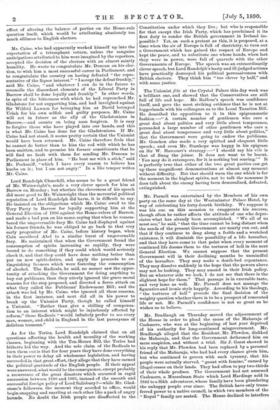Mr. Bradlaugh on Thursday moved the adjournment of the House
in order to plead the cause of the Maharaja of Cashmere, who was at the beginning of last year deprived of his authority for long-continued misgovernment. Mr. Bradlaugh alleged that the Resident, Mr. Plowden, disliked the Maharaja, and that the Government dethroned him on mere suspicion, and without a trial. Sir J. Gorst showed in his reply that Mr. Plowden had been replaced by a personal friend of the Maharaja, who had had every chance given him, but who continued to govern with such tyranny, that his people were actually starved, "gaunt with famine," caused by illegal ceases on their lands. They had often to pay two-thirds of their whole produce. The Government had not annexed Cashmere, a Mussulman State which Lord Hardinge sold in 1842 to a Sikh adventurer, whose family have been plundering the unhappy people ever since. The British have only trans- ferred power to a native council, in which two members of the " Royal " family are seated. The House declined to interfere by 226 to 88, and outsiders who know India may be permitted to wonder why Mr. Bracllaugh, of all men on earth, should plead the cause of an outrageous despotism, too bad even for Asiatic endurance, against a people. He seems to forget that, as we appointed and upheld the Sikh House of Cashmere— the single blot on Lord Hardinge's great character, and one excusable only by his desperate position at the moment—we are directly responsible for its misdeeds.















































 Previous page
Previous page